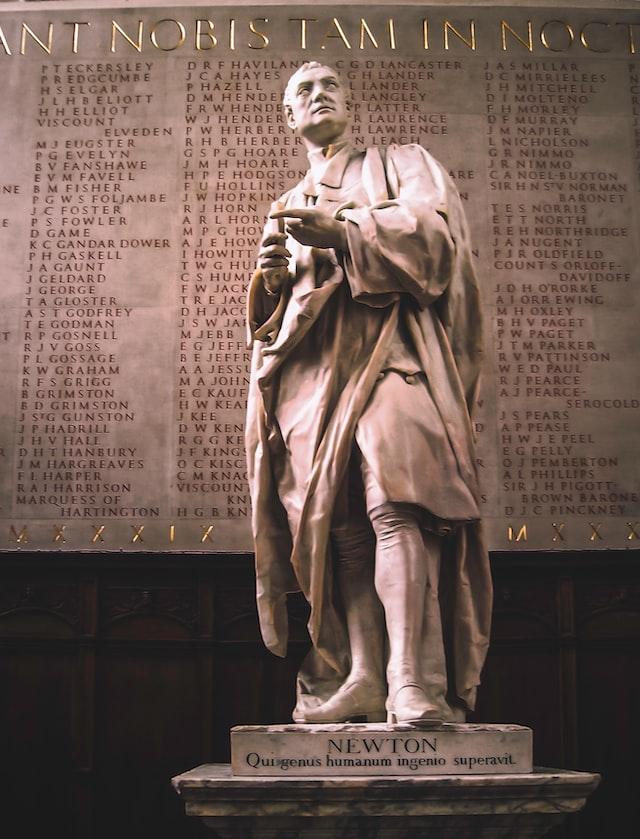By Curt Blattman of Bible Apologetics
Far from the Bible and science being enemies down through the centuries some of the greatest scientists of all time had a love affair with the Scriptures. For the following five great scientists the Bible became an indispensable resource in helping these men unlock many of the mysteries of the universe. For the skeptics, who believe that you can’t practice science and believe in the Bible, I ask them to consider the following:
Isaac Newton

Newton (1642 – 1727), perhaps the greatest scientist of all time, once said: “We account the Scriptures of God to be the most sublime philosophy. I find more sure marks of authenticity in the Bible than in any profane history whatsoever.”1
When all was said and done his discoveries are now legendary. Just one of his contributions to the world of science would have established Newton as a great scientist but the accumulation of his efforts leaves one breathless. According to Henry Morris: “Isaac Newton is famous for, among other things, his discovery of the law of universal gravitation, the formulation of the three laws of motion which make possible the discipline of dynamics and all its sub-divisions, and his development of the calculus into a comprehensive branch of mathematics, now a basic tool in every science. He anticipated the great law of energy conservation, developed the particle theory of light propagation, and as an astronomer constructed the first reflecting telescope.”2
As amazing as this may seem Newton devoted more of his time to studying the Bible and theology than to science and mathematics. His stepfather was a minister and Newton could often be found reading from his large library of religious texts. In addition, almost all of his fellow students and teachers from grammar school through college were impressed with Newton’s knowledge of the Bible. He believed that scientific investigation leads to a greater knowledge of God the Creator of the universe. In closing Newton once said: “I have a fundamental belief in the Bible as the Word of God, written by those who were inspired. I study the Bible daily.”3
Robert Boyle
Many of you may never have heard of Robert Boyle. But if I were to tell you that he is generally considered to be the father of modern chemistry, you might just be able to grasp his importance. Boyle (1627 – 1691), in addition to being a great scientist, was a strong believer in the Bible. His belief in the Word of God was so strong that he used a lot of his own money for Bible translation work. He apparently saw no conflict between being a man of science and a believer in the Holy Scriptures.
The following few quotes by this sincere Christian will help you realize how his love of science, God, and the Bible were intimately connected:4
“God would not have made the universe as it is unless He intended us to understand it.”
“As the moon, though darkened with spots, gives us a much greater light than the stars that sewn all-luminous, so do the Scriptures afford more light than the brightest human authors.”
“The gospel comprises indeed, and unfolds, the whole mystery of man’s redemption, as far forth, as it is necessary to be known for our salvation.”
“I use the Scriptures, not as an arsenal to be resorted to only for arms and weapons, but as a matchless temple, where I delight to be, to contemplate the beauty, the symmetry, and the magnificence of the structure, and to increase my awe, and excite my devotion to the Deity there preached and adored.”
Samuel Morse
The year was 1844 and Samuel Finley Breese Morse (1791 – 1872) was about to make history. For you see Samuel Morse was about to attempt the impossible – to transmit an electronic message, by what would later be referred to as Morse code, a distance of 40 miles from Washington, D.C. to Baltimore, Maryland. This new technology, the telegraph, a strange looking machine with attached copper wires, was all set to once again put the Bible on display, and oh incidentally prove a turning point in the advancement of human civilization.
Morse sat before his invention and ticked off its first message: “What hath God wrought!” This message was received seconds later by Morse’s assistant in Baltimore who promptly responded, a message back to Morse, to the amazement of all who were assembled to see if the telegraph would fail or became a part of communication history. It was only fitting that the first message sent on the telegraph was from the Bible – (Numbers 23:23) since Samuel Morse was a deeply committed Christian whose purpose in life was to honor the Lord in everything he did.
Morse was a world class inventor and internationally famous portrait painter but more than anything else he considered himself a humble servant of the Lord. When asked why he was selected to bring his monumental invention of the telegraph to the world he said: “I have made a valuable application of electricity not because I was superior to other men but solely because God, who meant it for mankind, must reveal it to someone and He was pleased to reveal it to me.”5
Just four years before his death in 1872 Morse reflected back on his career and forward to his future reward when he said: “The nearer I approach to the end of my pilgrimage, the clearer is the evidence of the divine origin of the Bible, the grandeur and sublimity of God’s remedy for fallen man are more appreciated, and the future is illumined with hope and joy.”6
In Part II of this devotion, we will look at the lives of two more great Christian scientists.
1 The Bible – Quotes from Famous Men – Why The Bible (why-the-bible.com)
2 Henry M. Morris, Men of Science: Men of God (El Cajon, California: Master Books, 1988), p. 23.
3 Isaac Newton Quote: “I have a fundamental belief in the Bible as the Word of God, written by those who were inspired. I study the Bible daily…” (quotefancy.com)
4 All of the above quotes by Robert Boyle are from the following website:
TOP 25 QUOTES BY ROBERT BOYLE | A-Z Quotes (azquotes.com)
5 Samuel Morse | Bible.org
6 What Leading Americans Have Said about the Bible | Houston Baptist University (hbu.edu)






